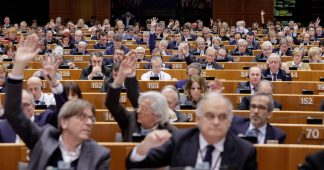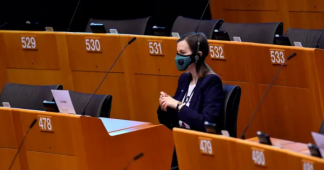November 2020
When newspapers and television stations report on EU legislation, it is usually about debates in the European Parliament or the summits of Heads of State and Government. Sometimes the media also mention that the responsible ministers from the EU Member States must somehow reach an agreement before a draft law can become EU-wide law.
But mostly citizens never find out exactly who are the people negotiating the paragraphs of hundreds of laws that govern all our lives every year, and who has taken which position. This ignorance is by no means accidental. The fact is that the bulk of the European Union’s legislation takes place in camera – behind closed doors.
It is not the often scolded bureaucrats of the EU Commission or the Members of the European Parliament who are to blame for this. Rather the national Governments of the 27 EU Member States are responsible. They are the ones who control the central legislative body of the EU – the Council of the European Union. There, in more than 150 committees and the ‘Council of Permanent Representatives’, officials, seconded by their national ministries, negotiate what their respective governments are prepared to make of the EU Commission’s legislative proposals. This is the central legislative process that governments systematically keep secret, to ensure citizens do not know what their governments actually do in Brussels.
Emily O’Reilly, the EU Ombudsperson, who was re-elected by the Parliament in December, found clear words for this system: “It’s almost impossible for citizens to follow the legislative discussions in the Council between national government representatives,” she said and concluded: “The practices that inhibit the scrutiny of draft EU legislation undermine citizens’ right to hold their elected representatives to account.” In other words, EU legislators are constantly breaking a central democratic principle, the transparency of legislation. In so doing, they themselves generate the mistrust of many citizens towards the European Union, which is what drives voters to nationalist right-wing populists.
Secrecy also makes the Council particularly vulnerable to the influence of lobbyists. After all, even a blocking minority is enough to block or water down a bill. All it takes to block or water down legislation is to win over the Government of one of the large Member States, which in turn will then make some of the smaller EU states compliant with offers in other areas. This secret lobbying power has caused well over a hundred important reforms to fail over the past ten years, such as the introduction of a turnover tax on speculation with securities or the securing of rights for employees in the new digital economy, without the public even knowing about it.
That is why the Investigate Europe team will be following the Council’s proceedings closely in future and – whenever possible – reporting on which government is blocking or watering down legislative proposals, and with whom it is in league.
Published at www.investigate-europe.eu











